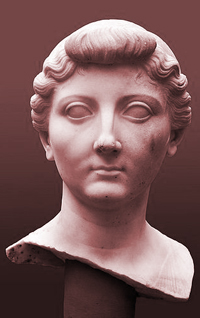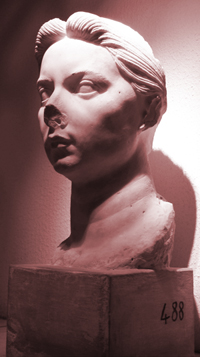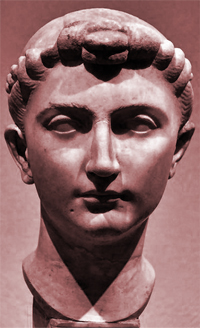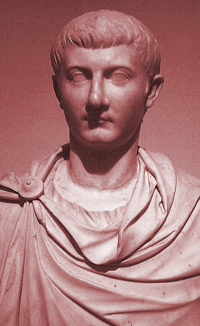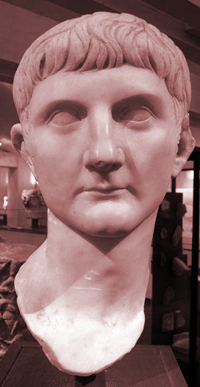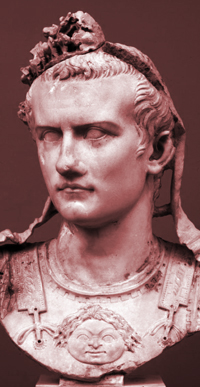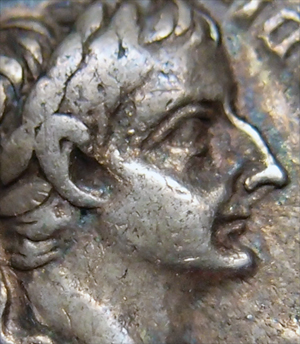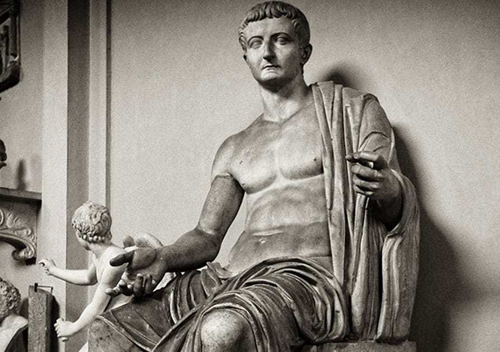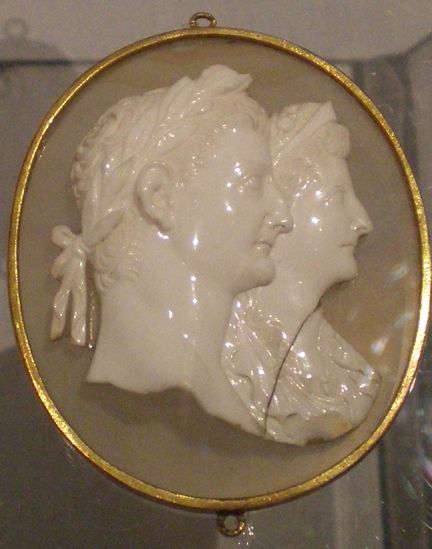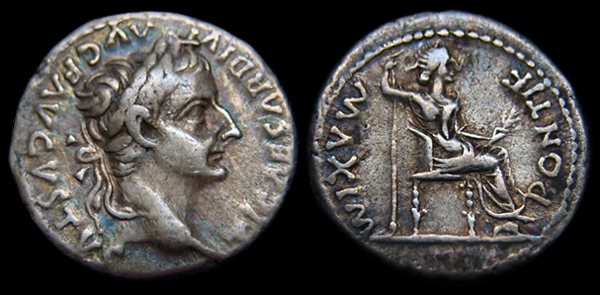
Denarius - IMP TIBERIUS - LIVIA
(RSC 30)
Tiberius Claudius Nero
Born: B.C. 42
Emperor: A.D. 14-37
Obverse: Portrait laureate head right - TI CAESAR DIVI AVG F AVGVSTVS
Reverse: Livia seated right on chair with ornate legs holding scepter and olive branch - PONTIF MAXIM
|
Bust of the Emperor Tiberius Julius Caesar
Livia Drusilla also known as Julia Augusta: Third wife of the emperor Augustus and mother of the emperor Tiberius. She exercised a powerful influence over Tiberius and within the first imperial family.
Vipsania Agrippina: First wife of the emperor Tiberius and daughter of Marcus Vipsanius Agrippa, the victorious general of the Battle of Actium against the forces of Marcus Antonius and Cleopatra. Tiberius divorced Vipsania against his will at the command of Agustus (non sine magno angore animi "not without great mental anguish") to marry his daughter Julia the Elder.
Julia the Elder: Second wife of the emperor Tiberius and daughter of the emperor Augustus. Tiberius was commanded to divorce his first wife and marry Julia. The marriage was not a happy one.
Drusus Julius Caesar or Drusus the Younger: The popular general and statesman and the natural son of Tiberius with his first wife Vipsania Agrippina. He, along with his cousin and adopted brother Germanicus, was in line to succeed his father. He either died of natural causes or was murdered by Sejanus.
Germanicus Julius Caesar: The very popular general and statesman was nephew and adopted son to Tiberius. Known for his highly successful campaigns against the Germanic tribes where he avenged the staggering losses to Rome under Augustus at the Battle of the Teutoberg Forest. He was considered one of Romes greatest heroes. He was very popular with the Roman people well after his death at the relatively young age of 33.
Gaius (Caligula): With the death of Germanicus in ADD 19 and Drusus in AD 23, Tiberius did not name an heir for more than a decade. In AD 35, two years before his death, Tiberius named his great-nephew and adoptive grandson (son of Germanicus) Gaius Caligula as his heir along with his sixteen year old grandson Tiberius Gemellus. Gemellus was put to death in late 37/38 leaving Gaius as sole emperor. | Inscriptions: TI(berius) CAESAR DIVI AVG(ustus) F(ilius) AVGVSTVS / PONTIF(ex) MAXIM(us) Tiberius Caesar Son of the Divine Augustus and Augustus / Greatest Pontiff The obverse of this coin depicts Tiberius, the second Emperor of Rome. The obverse inscription is his name as it was after the death of his adopted father the divine Augustus and shows his connection to the the Julian line. He shows here not only his connection to his adopted father Augustus, the first emperor of Rome, but also his connection to Julius Caesar who was the maternal great-uncle and adopted father of Augustus. With Divi Augustus Filius, he reminds us of the fact that he is the son and successor of a God. Depicted on the reverse is Livia Drusilla (Julia Augusta) wife of Austustus and mother to Tiberius by her first husband, Tiberius Claudius Nero. Livia is the link between the Julian and Claudian families who give their names to the founding family: The Julio-Claudian dynasty. Livia was Augustus's third wife and he was her second husband. She was from the Claudii, an old and distinguished family who exercised great influence since the early republic. Tiberius also reminds us that he is the Pontifex Maximus or the head of the college of priests of the Roman religion. Both a religious, state and political office. Minted early in his reign (est. AD 16 in Lugdunum), this coin is often identified (whether correctly or fanciful notion) as the so called Tribute Penny mentioned in in the bible. Mark 12:14 "...Is it lawful to give tribute to Caesar, or not?" The portrait on the coin may certainly have been of Tiberius, it also could have been Augustus. The coin could have been a denarius but it could very well have been another type of coin, or another type of denarius. The simple fact is there is just no way of knowing what exact coin type he held or who exactly was on it. There is, however, no doubt that if any of the commonly estimated years given for the birth and death of Jesus are correct, Tiberius was certainly in power at this time. Tiberius would have been nearing the end of a long 22 year rule that began when Jesus was most likely in his teens.
The emperor Tiberius was born Tiberius Claudius Nero at Rome, November 16, 42 BC. He was the eldest son to Livia Drusilla and her first husband who was also named Tiberius Claudius Nero. Both his mother and father were members of the wealthy and powerful Claudian family, specifically the Claudii Nerones. Since their rise to prominence in the days of the early Republic, members of the old patrician Claudia gens could often be found occupying the highest positions of power in Rome. They had a reputation of pride, arrogance and a disdain for the commoner. In 39 BC Livia divorced Tiberius Claudius Nero while pregnant with his second child to marry Gaius Julius Caesar Octavianus (later known as Augustus). The birth of his younger brother, Nero Claudius Drusus (Drusus), would occur soon after in March of 38 BC. The two powerful families merged and after the battle of Actium and the defeat of Antony and Cleopatra, Tiberius became the stepson of the First Emperor of Rome. While still quite young he rode in Augustus's chariot during his Triumph for the Battle of Actium in 29 BC and spent his teens as a prince in the first imperial family. The earliest public appearance of Tiberius was when he gave the eulogy on the death of his biological father in 32 BC. The new empire was not very formalized. Augustus was the first emperor and there was no formula, law or precedence as to how the imperial title would pass when he died. While the empire would soon become a giant bureaucracy with many laws, rules and traditions, the matter of succession was never codified and often changed on the wishes of the emperor in power. Augustus adopted Tiberius in AD 4 and elevated his younger brother Drusus, to whom he was very close, seeing them as potential heirs as well as representatives of imperium. However, he counted Marcus Agrippa, his close friend, son-in-law, general and a hero of Actium as his likely successor as well as his nephew and son-in-law Marcellus who was roughly the same age as Tiberius. Marcellus became ill and passed away in 23 BC at the age of 19, Drusus, who had become a celebrated general, died in 9 BC when he fell from his horse and died a month latter, probably from complications of that injury, and Agrippa, the true heir apparent who was almost as powerful and popular as Augustus himself, passed away in 12 BC at the age of 51. With the death of these men, Tiberius moved higher on the list of possible successors to Augustus. The idea that his mother Livia may have been somehow involved in the deaths of these men were put forth by some historians such as Tacitus and Cassius Dio who generally characterize her as plotting to install her son as emperor at all costs and over all others, including her husband.
Young Tiberius was well educated with an interest in Greek rhetoric. He served as an advocate in court until he entered into the service of his step father in the east under Marcus Agrippa. He would spend much of his life with the military, first under Agrippa in Armenia and soon after in his own right. He would greatly expand the empire and, in doing so, become one of Rome's greatest (but seldom mentioned as such) generals with his successes in Gallia Transalpina and his conquest of Pannonia, Dalmatia, Raetia and parts of Germania. He is also also credited with discovery of the sources of the Danube, something previously unknown to the Romans, in 15 BC In 19 BC, Tiberius was married to Vipsania Agrippina, the daughter of the great general Marcus Agrippa, and by most accounts he cared greatly for her. With the death of Agrippa, Augustus requested Tiberius divorce Vipsania and marry instead Julia the Elder, the daughter and only biological child of Augustus and widow of Agrippa. The union was not a happy one as it is reported he still longed for Vipsania. Tiberius continued to campaign for Augustus and Augustus continued to place upon him greater responsibility. He served as consul twice and in 6 BC he was granted tribunicia potestas and control in the East. With the death of Agrippa (his father-in-law), Tiberius was given more power and responsibility as he was clearly being prepared for the possibility that he may succeed Augustus. In a strange twist, just as he was being elevated to new heights, that same year he chose to instead retreat from public and military life and retire to Rhodes. The reasons for this can only be speculation but it is clear that Tiberius was not satisfied. It may have been the adoption by Augustus of his two grandsons Lucius and Gaius (sons of Marcus Agrippa and Julia the Elder.) Tiberius may have seen his own elevation as a stop gap measure until these young men came of age and resented the idea that he may be passed over. There is also ample evidence that he was not happy in his marriage to Julia. Tacitus points to this as the main reason for his retirement. This again put into question the matter of succession as Augustus was now forced to rely on his two teenage grandsons, Gaius and Lucius, who were far from ideal because of age and inexperience. The situation became even more dire after the death of Lucius in AD 2 after which Augustus allowed Tiberius to return to Rome. It is reported that Tiberius almost immediately regretted his decision to retire but was then forbidden to return by Augustus until the death of Lucius. After the death of Gaius in Armenia in AD 4 and the banishment of Aggrippa Postumus for unknown reasons in AD 7 (sources depict the young son of Agrippa as 'brutish' and 'devoid of every good quality'), Augustus had few other options than to again look to Tiberius as a possible heir. Certainly Tiberius could not help but be aware that he seemed to be the very last choice for the job. It is certainly as obvious today as it was to him then that Augustus did not want Tiberius as his successor. It could not have been because of any lack of experience as Tiberius had spent most of his life in public service as a loyal servant to Augustus and Rome and as a competent and successful general on the frontiers of the empire. The hesitation of Augustus to embrace the idea of Tiberius as his successor probably stemmed from the sincere wish for a blood relative to succeed and possibly a genuine dislike of Tiberius. He was returned from his retirement with the understanding that he would adopt his nephew Germanicus, the very popular son of his popular brother Nero Claudius Drusus from whom three later emperors claim direct decent: His son Claudius, his grandson Gaius 'Caligula' and his great-grandson Nero. Tiberius had a very close relationship with his brother. Tiberius named his son Drusus after his brother and his brother named his own son Tiberius Claudius Nero who would then take the name Germanicus, an honorific title that his father won for his actions against the German tribes and he himself would earn in his own right as commander of Germania. Tiberius was officially adopted by Augustus and given Tribunician power and a share of imperial power. In 13 AD he was raised to co-emperor and shared power equally with his adopted father. In August of AD 14 Augustus passed away at the age of 75, Tiberius was confirmed by his will as his heir, and by mid September he was acclaimed Princep Civitis, or Emperor, at the age of 55. This was a time of great uncertainty as it was the first time power had changed hands from one emperor to a successor and there were no set rules or precedence. The empire was still quite new and there were certainly still those who would see it abolished and a return to the Republic. Although he is criticized for putting on a show of being reluctant to take on the imperial titles when offered them by the senate, it was wise for him not to seem too eager for power or to try to fill the shoes of the now deified Augustus. Early in his reign Tiberius seemed to take a relatively hands off approach, seldom making his will explicitly known or issuing commands. He instead made speeches touching on general points of concern and looked for the senate to take appropriate action but the senate found it difficult to ascertain precisely what actions he would wish them to take. He looked for them to take initiative but in general they seemed hard pressed to agree on a course of action without explicit instructions leading Tiberius to assess them as "Men fit to be slaves." Needless to say his relationship with the senate was strained and would only worsen as time went on. Also, early in his reign there were violent insurrections in the ranks of Rome's many legions in Illyricum and Germany over bonuses promised by Augustus that remained unfulfilled as well as the lack of response from Tiberius over the matter. Tiberius sent Drusus to Illyricum (later Pannonia and Dalmatia) and Germanicus to Germany to quell the uprisings. In Illyricum Drusus regained control and executed the leaders. He would soon after govern that province. In Germania, Germanicus brought an end to the problem through negotiation and paying bonuses. He then went on to launch devastating attacks against the restless German tribes. In these attacks he fought Arminius and recovered eagles lost during the disastrous defeat to the Germans at the Battle of the Teutoburg Forest in 9 AD. With these successes and a full triumph, the first since Augustus, there grew a popular reverence for Germanicus among the citizens of Rome. He was given imperium in the east and seemed the most likely heir to Tiberius. Not long after, Germanicus suffered a prolonged illness and died, but not before accusing Gnaeus Calpurnius Piso of poisoning him. Piso, who was Governor of Syria and whose family had close ties to the Claudians, was to be put on trial but he instead committed suicide. With the death of Germanicus, the succession fell to the emperor's own son Drusus. Tiberius appointed the equestrian Lucius Aelius Sejanus, a man who had worked for the imperial family for many years, as Praetorian Prefect in AD 14. Initially he was co-Prefect with his father Lucius Seius Strabo until Strabo's appointment as governor of Egypt when Sejanus became the sole prefect. In this position Sejanus would accumulate great power, both militarily and politically, and would eventually exercise significant influence through his close relationship with Tiberius who placed great trust in him. Beginning around AD 22, Tiberius began a gradual retirement from public life starting with his ever longer trips to Campania and ending with his permanent retirement to the Island of Capri in AD 26. As he invested more responsibilities to Drusus as his son and heir, he had also invested even greater power to Sejanus who, in the absence of the emperor, served as his eyes, his ears, his mouthpiece, protector and closest advisor. Sejanus positioned himself as almost the de facto emperor, eventually holding the consulship with Tiberius despite his equestrian rank. There developed a rivalry between Sejanus, who Tiberius had referred to as "Socius Laborum" (partner in my labors) and Drusus his rightful son and heir. Tacitus reports that during an argument Drusus struck Sejanus with his fist and lamented that "a stranger was invited to assist in the government while the emperor's son was alive." In AD 23 Drusus died suddenly from what appeared to be natural causes. The alternative story is that Sejanus seduced his wife Livilla who helped him poison her husband. If he had a hand in the death of Drusus, Tiberius did not suspect it as Sejanus would continue to serve the emperor for years after the death of Drusus. Tiberius would even offer Livilla, now the widow of his son Drusus, to Sejanus in AD 31 which would have made him a part of the imperial family. With the death of Drusus, Sejanus lost a major rival to his power and was emboldened. However there was still one person in Rome who held sway over Tiberius for most of his life and whose continued presence may have stayed the ambition of Sejanus in the absence of Tiberius and Drusus, the emperor's mother Livia, the widow of the now deified Augustus. A powerful force in the early empire, Livia has been accused by ancient historians of having great ambitions for her son Tiberius to the point that she sought to rid the many obstacles in his path at all cost. The relationship between the emperor and his mother appear to have been good, a fact that might be evidenced by this coin which honors her on the reverse, but it seemed to become strained over time, possibly because of her unwanted influence on not only him but the people of Rome. It could be that she was a constant reminder that he owes his position to her and his exit from Rome may have been partly about removing her influence from his life. Regardless of the rumors of poisonings, family intrigue and the strict control she exercised over her family and all those around her, she was still held in high esteem and had great sway in Rome and her presence in Rome was both a boon and a thorn in the side for Tiberius. Livia died in AD 19 and by this time she had no contact with her son who would not leave his island to go to her funeral. With the death of Livia and the prospect of becoming a part of the imperial family through a promised marriage, Sejanus was arguably the most powerful man in Rome. Set on consolidating his power and removing all potential rivals he carried out arrests and held treason trials in AD 30-31 to purge those in the ranks of the senate that might oppose him or Tiberius. He and Tiberius also began a purge of the imperial family with the arrest of Agrippina the Elder, wife of the popular general Germanicus, and her sons Nero and Drusus among others. All three would later die in mysterious circumstances, Agrippina and Nero would be exiled and later either take their own lives or were executed and Drusus would be imprisoned where he would starved to death. Caligula, his great-nephew would survive this purge and eventual go on to live with Tiberius on the island of Capri for the final years of his life. Although ancient sources say he hated Tiberius for what he did to his family, he was able to hide his true feelings as a matter of survival. It is unclear exactly how ambitious Sejanus was but it seems unlikely he sought to usurp the throne from Tiberius as much as consolidate imperial power through Tiberius and marriage into the imperial family. It is also unclear how much authority Sejanus actually had thus he is often depicted as either the man who manipulated an emperor or a man manipulated by that emperor. It is hard to believe that Tiberius was uninformed. Actions taken by Sejanus enriched both men and often remove possible threats and rivals to both. By the end of AD 31 Tiberius changed his views on Sejanus and his end came swiftly. It is unclear what caused Tiberius to take action against Sejanus. It may be that he was alerted to a conspiracy by Antonia Minor, mother of Livilla, it may be that Sejanus was just a tool that had lost its usefulness or it may be that his ambition eventually made him too dangerous to the old emperor. Tiberius appointed Naevius Sutorius Macro, who was the prefect of the vigiles (fire and night watch), as Praetorian Prefect and Sejanus was arrested and executed by strangulation without a trial. His family would also be executed as well as his friends and anyone associated with him. Livilla either committed suicide or was was killed, possibly by her mother Antonia Minor who may have locked her up in a room and refused food until she starved to death. The treason trials did not die with Sejanus but continued to include anyone who could be tied to the disgraced prefect. Although ancient sources depict great purges in the last years of the Reign of Tiberius, some historians note that there is little evidence of a mass prolonged purge. On the purges under Tiberius historian Edward Salmon wrote that "In the whole twenty two years of Tiberius' reign, not more than fifty-two persons were accused of treason, of whom almost half escaped conviction." Tiberius spent the final years of his 22 year reign in self imposed exile while the bureaucracy of the empire continue to function without his direct involvement until his death in AD 37 at the age of 77. Little had been settled in the matter of who would succeed him leaving the matter to his will which named both his grandson Tiberius Gemellus and his nephew Gaius Caligula, son of Germanicus, as joint heirs. Soon after the death of Tiberius, Caligula voided the will of Tiberius making himself sole ruler and, after a brief illness, either killed Gemellus or forced him to commit suicide. As is so often the case with the death of an emperor, the sources claim foul play, this time on the part of Caligula who they say had him murdered on his death bed. The truth concerning the last hours of the life of Tiberius remain unknown. When looking at the sources for the life and reign of Tiberius it is important to understand the fragile and often contentious nature of the new empire. With the rise of the pricipate, the senate, powerful families who were previously the supreme governing body of Rome, were often sidelined and at the whim of the emperor or his agents like Sejanus or Macro. In reality the emperor probably did have many enemies who would see him removed in order to return Rome to a Republic ruled again by the senate as the highest authority. While Augustus was revered as a hero of the civil wars, who brought peace and stability to Rome, who received his titles from the senate and largely sought to portray himself as merely first among equals, his successors were far less respected and their positions more tenuous, thus their actions were probably necessarily more autocratic if they were to maintain their position. Many of the sources for the life and rule of Tiberius could be said to be biased because of their positions that may have placed them at odds with the emperor. It is clear that the information the sources report, for the most part, was not first hand information and it is impossible to know for sure how bias they were against him or what information they included in their works is factual, hearsay, or complete fabrication. It did not help that with Tiberius, he was largely absent during the later part of his rule living in seclusion on a private island. His absence allowed the imaginations of historians, and those who lived during this time, to run wild and fill in the blanks when it came to what motivated Tiberius or how he lived his life in self imposed exile. Rumors certainly abound in such a situation and there were many pertaining to Tiberius, his nature, his motivations, and how he lived his life away from public view. Base cruelty, sex circuses, perversions and pedophilia were only a few of the stories that come to us leaving modern historians to try to suss out the truth, the bias, and rumor. What is clear is that his legacy is that of a tyrant and this remained so into modern times. Although he left a fortune upon his death, he is accused of making that fortune at the expense of his victims, although the empire was healthy, he is given little credit, although he was a great general in his younger days, his accomplishments are largely overshadowed by those of Germanicus and the reported actions later in his life as emperor.
|


